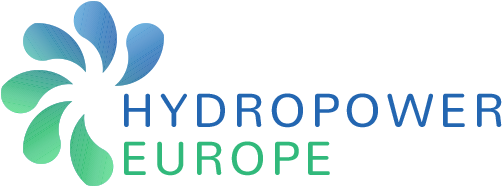Hydropower in Europe
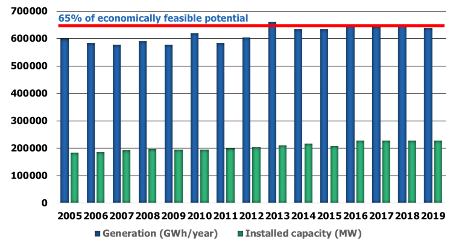 Figure 1: Evolution of yearly production and installed capacity of hydropower in Europe since 2005 (according Hydropower & Dams World Atlas 2020).
Figure 1: Evolution of yearly production and installed capacity of hydropower in Europe since 2005 (according Hydropower & Dams World Atlas 2020). Figure 2. Generation and extension potential of hydropower in countries in the European region (according Hydropower & Dams World Atlas 2019).
Figure 2. Generation and extension potential of hydropower in countries in the European region (according Hydropower & Dams World Atlas 2019).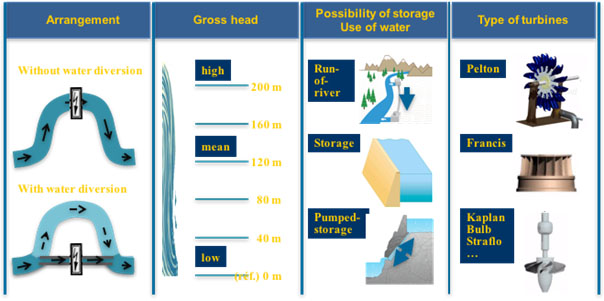 Figure 3: Characterisation of hydropower plants.
Figure 3: Characterisation of hydropower plants.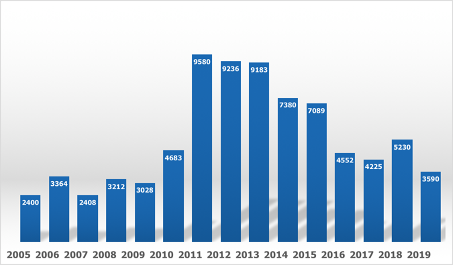 Figure 4: Installed capacity in MW under construction since 2005 (according to Hydropower & Dams World Atlas 2020).
Figure 4: Installed capacity in MW under construction since 2005 (according to Hydropower & Dams World Atlas 2020).Hydropower has a long history in Europe and in the first half of the last century contributed significantly to industrial development and welfare in most of the countries of Europe. Today, almost 650 TWh are generated in an average hydrological year, which equates to about 65% of the economically feasible hydropower potential within Europe including Turkey (Figure 1). Since a few years, the yearly production of hydropower stabilizes near 650 TWh and the total installed capacity near 230 GW. It should be noted, however, that the yearly hydropower production is influenced by the hydrological situation each year.
Figure 2 shows the situation of the hydropower use and untapped potential in the different countries in the Europe region. It can be noticed that in many countries have still a considerable potential of development. The highlighted countries in Figure 2 have developed less than 50% of the economical feasible potential if the market conditions would ask for it.
Types of Hydropower Plants
In general hydropower plants, can be characterised according the criteria arrangement, gross head, possibility of storage and types of turbines as shown in Figure 3.
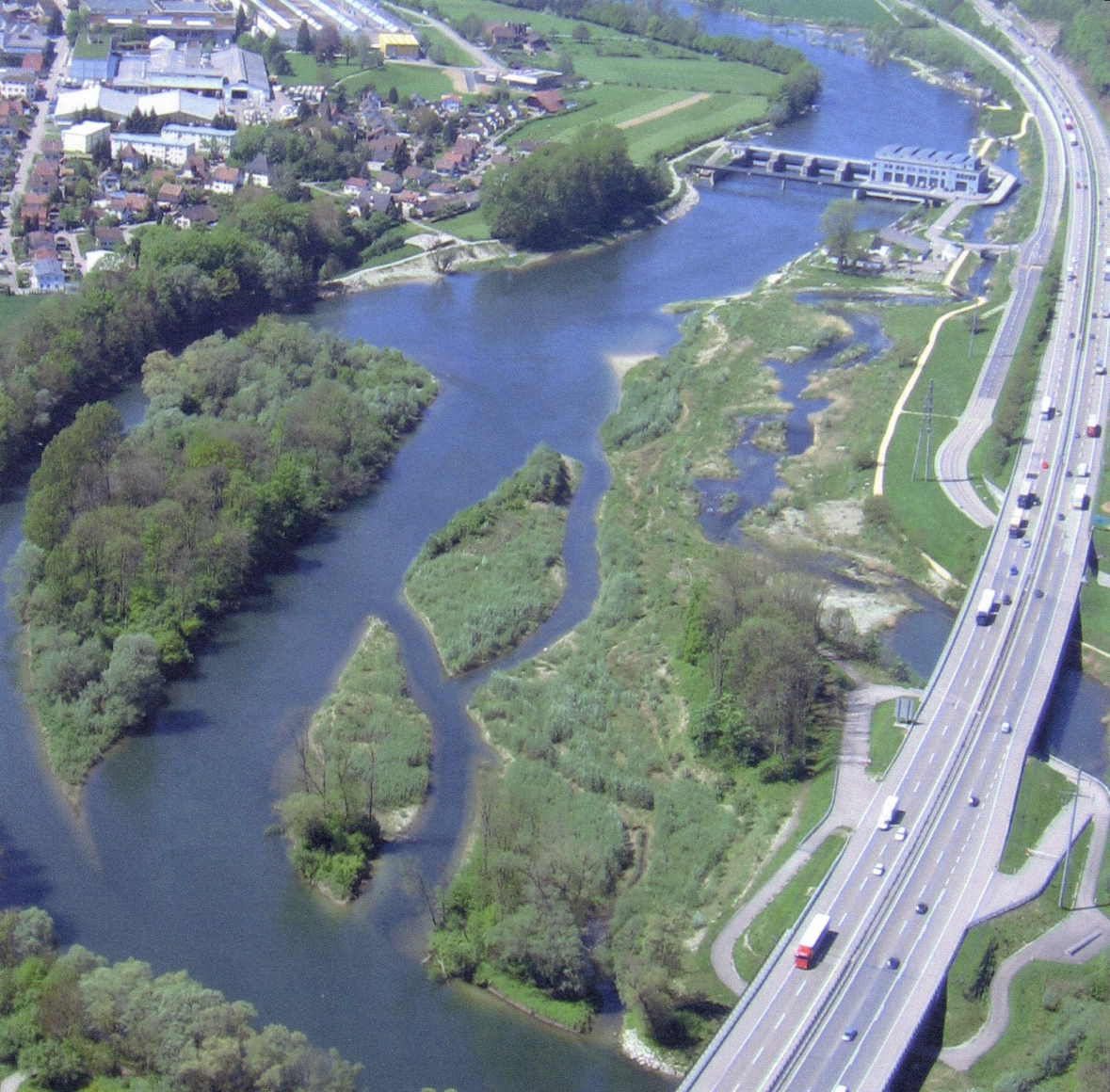
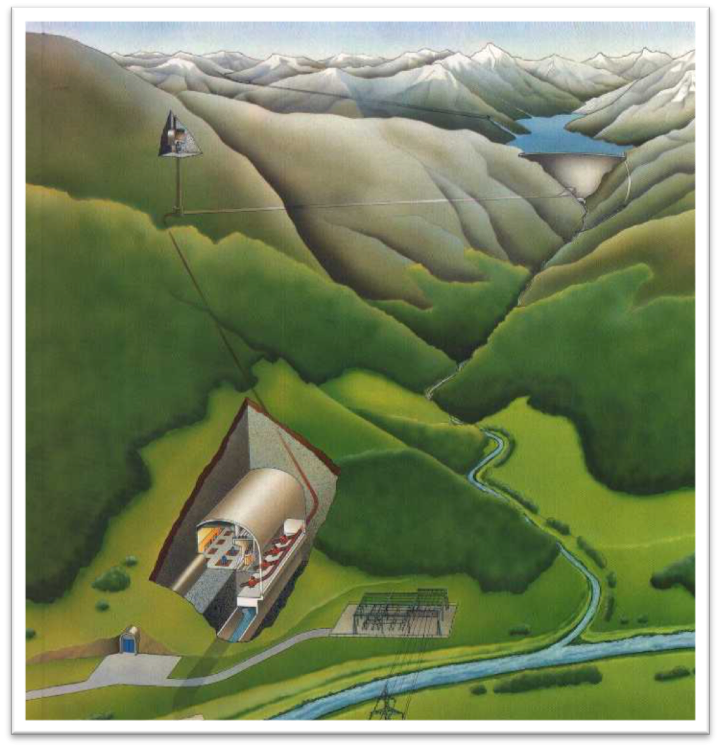
Schematic presentation of a storage hydropower scheme with an underground powerhouse
Advantages of Hydropower
Hydropower in Europe, and indeed worldwide, has many advantages such as:
- Renewable energy supply without the direct emission of CO2 and with an unbeatable energy pay-back during its technical lifetime
- Excellent efficiency, production can be easy adapted to the demand (very flexible and timely response to peak energy demands)
- In-country energy, creating jobs and financial resources in remote areas (taxes and concession fees)
- Improvement of infrastructure along with potential for recreational and tourism activities
- Contribution to flood and drought protection
- Facilitating navigation on the large rivers in Europe
Today's Challenges of Hydropower in Europe
Nevertheless, relatively little investment has been undertaken over the last 15 years as can be seen in Figure 4 which shows the installed capacity under construction. In 2011, a quite significant increase of the construction of new power plants reaching almost 10’000 MW can be seen. This may be attributed to the Fukushima catastrophe leading many countries to redefine their energy strategy towards renewable sources such as hydropower alongside the planned phasing out of nuclear energy. Since then, however, construction activity has been decreasing until today below 4000 MW with an activity above 5000 MW in 2018.
The low investment level today can be attributed to fact that current electricity prices on the European spot market are very low due the following reasons:
- Production capacity in Europe is too high (especially via conventional thermal generators using coal)
- Cost of CO2 certificates are very low
- The actual market is distorted due to the high subsidies provided for renewable energy sources such as solar and wind
Thus, under such market conditions hydropower generation is strongly penalized. However, after reduction of these subsidies and actual market price distortions, and after economic recovery in Europe, the attractiveness of the extension and upgrading of existing hydropower plants, with the purpose of making them more flexible through the refurbishment of equipment and increasing storage where possible, together with the construction of new pumped-storage power plants, will increase strongly. Furthermore, in many countries a significant amount of untapped hydropower potential still exists. However, in view of environmental and socio-economical constraints, the partial use of this remaining potential is extremely challenging and can be reached only through innovative and sustainable solutions for new hydropower plants.
Future Role of Hydropower in Europe as a Catalyst for the Energy Transition
Hydropower plays an important role today and will become even more important in the coming decades, since hydropower can be a catalyst for the energy transition in Europe.
The ambitious plan for energy transition in Europe seeks to achieve a low-carbon climate-resilient future in a safe and cost-effective way, serving as a worldwide example. The key role of electricity will be strongly reinforced in this energy transition. In many European countries, the phase out of nuclear and coal generation has started with a transition to new renewable sources comprising mainly of solar and wind for electricity generation. However, solar and wind are variable energy sources and difficult to align with demand. Hydropower already supports integration of wind and solar energy into the supply grid through flexibility in generation as well as its potential for storage capacity. These services will be in much greater demand in order to achieve the energy transition in Europe, and worldwide.
Hydropower, with it’s untapped potential, has all the characteristics to serve as an excellent catalyst for a successful energy transition. However, this will require a more flexible, efficient, environmentally and socially acceptable approach to increasing hydropower production to complement wind and solar energy production. In particular:
- Increasing hydropower production through the implementation of new environmentally friendly, multipurpose hydropower schemes and by using the hidden potential in existing infrastructure.
- Increasing the flexibility of generation from existing hydropower plants by adaptation and optimization of infrastructure and equipment combined with innovative solutions for the mitigation of environmental impacts.
- Increasing storage by the heightening of existing dams and the construction of new reservoirs, which have to ensure not only flexible energy supply, but which also support food and water supply and thus contribute to the Water-Energy-Food NEXUS and achievement of the Sustainable Development Goals of the United Nations.
- Strengthening the contribution of flexibility from pumped-storage power plants by developing and building innovative arrangements in combination with existing water infrastructure.
Climate change will be an important issue for hydropower development in Europe. The effect of climate change will not only change the availability of water resources in time but will also change the behaviour of the catchment areas through increased sediment yield and more frequent natural hazards, thus endangering hydropower production in the future. It is recognized that the reservoirs associated with hydropower plants will have to contribute more and more towards the mitigation of climate change effects.
Through an extensive programme of review and consultation addressing the whole hydropower sector and stakeholders (including construction, production, environmental and social issues), the Hydropower Europe Forum will provide a focal point for reviewing and developing hydropower in Europe, and subsequently European hydropower within the wider world. Building from the extensive programme of consultation, the Hydropower Europe Forum will develop a strategic research and innovation agenda as well as a roadmap towards implementation of the vision.
Latest News
EVENT: Developments and biodiversity of watercourses. 8-10 November 2022
"Aménagements et biodiversité des cours d’eau" (EN: "Developments and Biodiversity of watercourses") is a conference organised by the Societé Hydrotechnique de France (SHF), next 8-10 November 2022 in Strasbourg, France. About the confere...
CONFERENCE: "QUO VADIS? Innovation potential of Hydropower" 27 - 28 October 2022
"QUO VADIS? Innovationspotential der Wasserkraft" (Innovation potential of Hydropower) is a conference organised by IBI- Kompetenz, the multidisciplinary platform for e...
JOINT LETTER: Renewables displace fossil fuels - the Innovation Fund must recorgnise this
Joint letter signed by: Bioenergy Europe, the European Heat Pump Assocition (EHPA), the European Renewable Energies Federation (EREF), the European Solar manufacturing Council (ESMC), the European Solar Thermal Electricity Association (ESTELA), Solar Heat Europe (ESTIF), Solar Power Europe, the A...
ETIP HYDROPOWER EUROPE: The permanent and common voice of Hydropower in Europe
ETIP Hydropower Europe (ETIP Hydropower) is a new project in the EU programme ...
Prof. Anton Schleiss at the 7th IAHR Europe Congress (Greece)
Prof. Anton Schleiss, from the International Commission on Large Dams (ICOLD - CIGB), was invited as a keynote speaker for the opening session og the ...
Hydro Power Industry Guide 2021/22 by VGBE
After the success from "Hydro Power Industry guide 2020/21", our colleagues from VGBe wanted to offer us the new guide from this year: “Hydropower Industry Guide 2021/22”. vgbe´s ...
POSITION PAPER: Hydropower as a catalyst and facilitator for the clean, safe and independent energy transition in Europe.
Key Messages: Given Europe’s ambition to raise the renewables target to 45%1 hydropower is critical to ensure Europe’s energy system has the necessary renewable electricity and flexibility to protect grid stability from intermittent renewable energy, to sustain the gr...
NEW PUBLICATION, Hydroscience Journal: "Hydropower, a catalyst for energy transition in Europe"
On the context of HydroES 2021 (22 September 2021), Hydropower Europe had the chance to present its vision and results achieved during three years of consultations. Some of the conclusions are: Hydropower still has a great potential for development Hydropower sector needs...
HYDRO 2022 Strasbourg: How to promote future hydro development in Europe with a sustainable impact?
The HYDROPOWER EUROPE project (2018-2022), funded from the European Union's Horizon 2020 research and innovation program, has released its final deliverables: a Research and Innovation Agenda (RIA) and a Strategic Industry Roadmap (SIR) for the hydropower sector. The challenge is...
Webinar 28 february 2022: What Research and Innovation are Needed to Tap More Hidden Hydro Opportunities in the Future?
The IEA Technology Cooperation Programme (TCP) on Hydropower (also known as IEA Hydro) is a working group of the International Energy Agency's member countries and others that have a common interest in advancing hydropower worldwide. Under the work programme Annex XVI...
